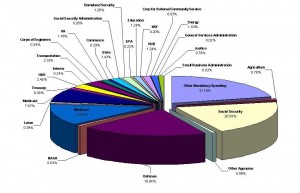America threatens to become a know-nothing society

Our ignorance of the budget has made the challenge of deficit reduction nearly intractable. What we don’t know is a gaping hole in our psyches that is filled daily with junk information entertainingly wielded by performers with books, television and radio shows to hawk. What we don’t know is killing us.
Bruce Bartlett, a former senior policy analyst in the Reagan White House and deputy assistant secretary for economic policy at the Treasury Department during the George H.W. Bush administration, recently wrote in The Fiscal Times:
“Unfortunately, the media believe that facts are boring and people just want opinions—the more strongly held the better because that makes for better television. And politicians are by nature purveyors of lies and mischaracterizations. But at some point, people need to know the truth.”
The truth that Bartlett refers to is that programs the public most wants to cut are those least likely to provide the needed result, and those programs the public most wants to protect are the ones that need to be trimmed from a fiscal perspective. The perfect example is foreign aid, which accounts for a mere one half of one percent of the U.S. budget. Pew Research studies show that the public believes foreign aid accounts for 27 percent of the budget – more than one-quarter of our national expenditures.
Such a radical difference between belief and reality seems difficult to explain except by a willful effort to either obfuscate or overlook the facts for political gain. By allowing the public to focus its anger on foreign aid, Congress can protect the sacred cows of defense spending, Social Security and Medicare – the real culprits in our budget crisis.
However, there are reasons that the pubic may believe that our foreign affairs expenditures are to blame for the nation’s budget problems. In recent foreign adventures, the lines between foreign aid and defense spending have been blurred as much of our soldiers’ efforts have been directed towards “nation building.” The concept was popularized after World War II when the U.S. Marshall Plan was credited with re-building Europe.
In modern warfare, the U.S. has mixed its fighting efforts and nation building into a single thread in which we try to create a political structure that supports the military goals we have for a particular country. Vietnam and Afghanistan are primary examples of this type of “on the fly” nation-building.
One of the crucial differences between the Marshall Plan efforts and military-based nation-building is the source of funding. The Marshall Plan was a State Department invention. Today’s nation-building is under the aegis of the Defense Department, and often overseen by poorly trained and poorly equipped military personnel (demonstrated most clearly in the documentary film “Restrepo” that was reviewed here several months ago).
So in a sense, the public’s frustration with “foreign aid” is at least in part a frustration with defense spending, in part a lack of knowledge about the amount of our budget that goes to foreign aid, and in part the absence of aggressive advocacy for foreign aid and the benefit it brings to the nation.
Bartlett reminds us that the last time anyone got serious about explaining the nation’s budget was during Ross Perot’s two presidential campaigns. His famous “charts and graphs” approach to explaining the U.S. budget problems and processes won more converts than any third party candidate since Theodore Roosevelt. Since then, politicians have backed away from explaining the fundamentals of budget management and chosen instead to take an ideological approach to such issues as foreign aid, women’s health and the EPA.
Meanwhile, the popular big three money hogs – defense spending, Social Security and Medicare – are treated with kid gloves because survey after survey shows strong public support for these programs. Sadly, our leaders today not only lack the temerity to explain hard choices to the American people, but also lack the will to push through plans to deal with them.




